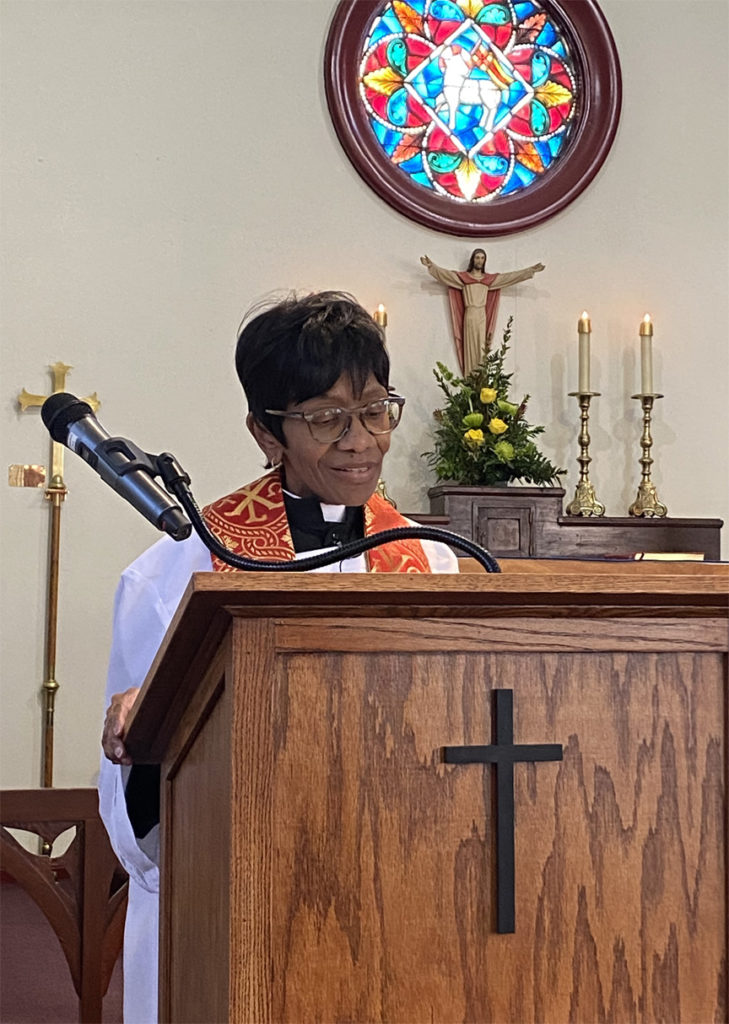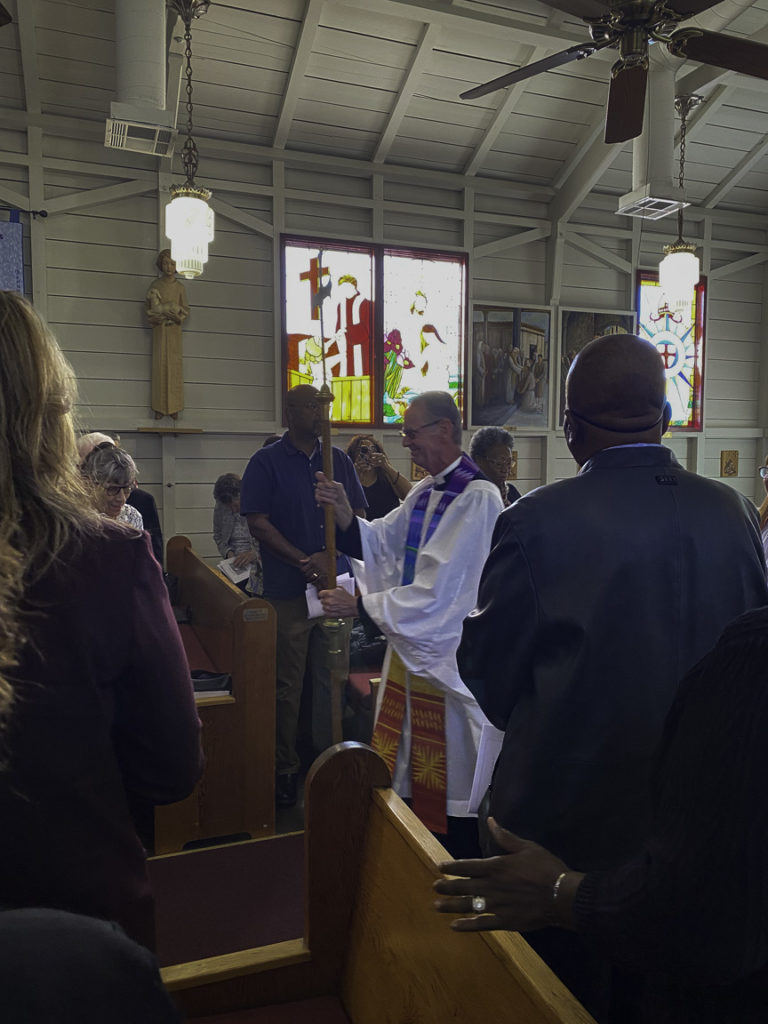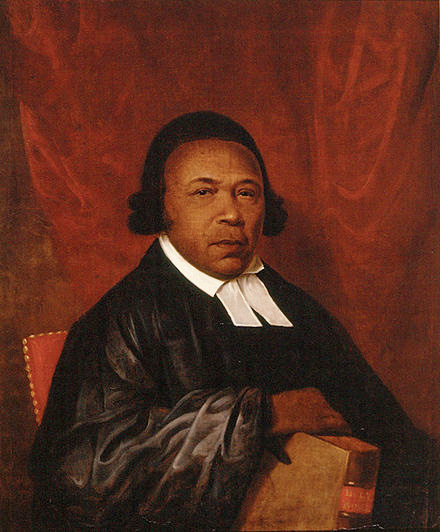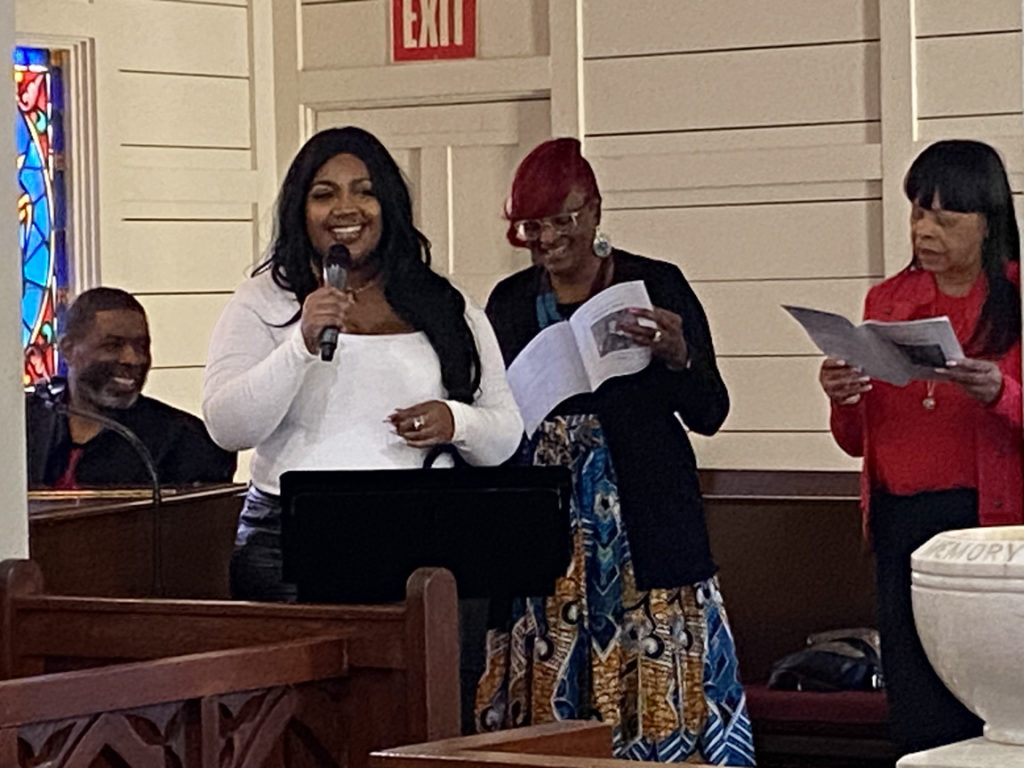
Stacey Forte-Dupré, a recently ordained priest serving congregations in Deanery 7 of the Diocese of Los Angeles, preaches at a celebrating of Absalom Jones at St. Stephen’s, Beaumont. Photo: Keith Yamamoto
[The Episcopal News] The Rev. Stacey Forte-Dupré challenged worshippers at the Feb. 19 first annual Absalom Jones service at St. Stephen’s Church in Beaumont to be “prophets of resistance” amid an appreciative chorus of “Amens” and “Hallelujahs.”
Prayer, prophecy, and praise are ways to honor God while offering nonviolent resistance to disrupt the domination, power, and oppression in the world today, she said.
“Absalom Jones is an example of a nonviolent way of resistance. His life and ministry offer us an example of prayer as resistance,” said Forte-Dupré, who planned the service and served as preacher. She is part of the Inland Empire Deanery 7 collaborative ministry triad.
In addition to St. Stephen’s, the triad also includes St. Alban’s Church in Yucaipa and Trinity Church in Redlands. The Very Rev. Bill Dunn, along with the Rev. CC Schroder and Forte-Dupré, share ministry and resources in all three locations. Dunn serves as dean of Deanery 7 and as Trinity’s priest-in-charge; Schroder is primarily assigned to St. Alban’s and Forte-Dupré’s main parish is St. Stephen’s.
Dunn welcomed worshippers to the gathering, including nationally known gospel singer and music minister Sandy Beamon and the Praise Team, and praise dancer Charisma Ballard. Others from across the diocesan community in attendance included: Suzanne Edwards-Acton, co-chair of the Program Group on Black Ministries; and Lacy Mason, a parishioner at St. Peter’s, Rialto, who sang “Lift Every Voice and Sing,” often called the Black national anthem.
Clergy in attendance included the Rev. Ryan Macias (All Saints Church and St. Michael’s Ministry Center, Riverside); the Rev. Susanne Wright-Nava; the Rev. Karri Backer of St. George’s, Riverside; the Rev. Jay Tillitt, who assists the Deanery 7 collaborative ministry triad; and the Very Rev. Keith Yamamoto, rector of St. Mark’s, Upland and dean of Deanery 6.
“We had six of Deanery 7’s congregations represented at the service,” Dunn said.
Forte-Dupré said she selected the music and participants intentionally, because they represented “sort of a journey for me,” from growing up in the Church of God in Christ through becoming an Episcopalian and her Jan. 14 ordination at St. John’s Cathedral in Los Angeles. Her fellow ordinands Macias and Wright-Nava also participated in the Feb. 19 service.

Bill Dunn, dean of Deanery 7 and leader of the ministry triad serving St. Alban’s, Yucaipa; Trinity, Redlands; and St. Stephen’s, Beaumont leads the processional into St. Stephen’s for the Absalom Jones service. Photo: Keith Yamamoto
A former All Saints, Pasadena, parishioner and retired Los Angeles County social worker, Forte-Dupré moved to Beaumont 13 years ago and became involved at St. Stephen’s, she said. Her message about Jones was intended to be prophetic, “about resistance, about justice, and I hope it stirred those who needed to be stirred,” she told The Episcopal News later.
The “hard work” of reconciling racial and social justice and disability issues is a customary part of the life of St. Stephen’s congregation, she said.
“In that small space we talk about those who are otherly-abled,” said Forte-Dupré, who lives with lupus, an autoimmune disease, and uses a cane. “The people there raised up a priest who is Black, female, and otherly-abled,” she added.
“They have loved me back to community, because at one point I thought I would not be able to be ordained because I’m limited in what I can do. Sometimes the fatigue would say to me how long I could do something, and St. Stephen’s members would say, ‘you can get the job done, but let’s see how you need to get it done’, and that was huge in helping me to reframe my identity,” said Forte-Dupré, who is a former president of the H. Belfield Hannibal chapter of the Union of Black Episcopalians and current network coordinator for Province VIII’s Black African Ministries.
That love and hard work helped frame her message about Jones, she said. “If we don’t speak up and sometimes speak up loudly, a lot of times we show up and we whisper or we show up thinking we have to be polite while others are speaking their messages so loudly and they don’t care about the next person. We have truth behind us, because we have Christ with us and we seem to just want to be quiet.
“And that’s what I was trying to say; we show up with a candle, and sometimes we want to cover the candle. We need to have the microphone because we are the actual light. We are the light.
We need to bring the microphone and use it.”
Dunn pointed to a banner recalling St. Agnes’ Episcopal Church, which was organized in nearby Banning in 1959, and closed in 2006. Forte-Dupré felt very strongly about using that banner to represent her at her ordination, he said. “We learned in a history day that there was a time the city of Beaumont was what we in the South used to call a sundown community,” he said. “If you were a person of color, you could work here, but when the sun went down you went home, and home wasn’t in Beaumont.”
Additionally, “there were people of color who wanted to worship here in this space, and they weren’t exactly told no, but they were certainly not told yes,” which was one of the reasons St. Agnes formed in the first place, “and why Stacey felt strongly that she wanted to have that banner lead her in” to St. John’s Cathedral for the ordination.

Absalom Jones, first Black man to be ordained a priest in The Episcopal Church in the United States.
Absalom Jones – prophet of resistance and prayer
Absalom Jones and his friend Richard Allen, leaders of the free Black community in post-Revolutionary War Philadelphia, were removed one Sunday from St. George’s Methodist Church when they refused to move to a segregated section of the church designated for freed slaves. Jones was praying when approached by church members who demanded he move or leave. He continued praying, refusing to budge, until they forcibly removed him and Allen.
Rather than worship in forced segregation, Jones and Allen founded the African Methodist Episcopal Church and, after the two men disagreed on matters of religious doctrine, established the African Episcopal Church of St. Thomas in Philadelphia in 1792, “still in existence today and it is vibrant, a wonderful church that is thriving,” Forte-Dupré said.
Notwithstanding the treatment they had received, Jones and his congregation ministered to some of those same white parishioners during the 1793 yellow fever epidemic in Philadelphia, she said.
“Resistance is not always against power,” said Forte-Dupré, to a chorus of “Amens.” “Some of these sick people were the very members who refused to worship with Jones and Allen. But he decided that he was called to care for these sick people. He said God called him and his congregation to care for them. You see, resistance is also about justice.”
Preaching from the Old Testament prophet Isaiah (42:5-9), she added: “It is about knowing your calling, regardless of what other people might say. [Isaiah] maps out in our reading today that justice is a communal calling, a communal ministry and that’s what Absalom Jones is teaching us in what he and his congregation did. It is what the bishop [William White in 1794] did when he answered the call to admit Absalom Jones and his congregation into the diocese.” White ordained Absalom Jones to the priesthood in 1804 as the first Black priest of The Episcopal Church.

Gospel singer and music minister Sandy Beamon and the Praise Team perform at the Absalom Jones service. Photo: Keith Yamamoto
Forte-Dupré urged those in attendance to “use your voice to demand justice, by speaking truth to the powerful, by pushing back on what you know is untruth, by pushing back on what you know is foolishness. When you hear it, and it’s not right, say it’s not right. Don’t take it.”
Additionally, she said, “God calls us to participate in justice work, in the demanding of justice in this nation.” People of color – America’s minorities – “the Brown folk, the Black folk, other people of color” have always relied on church activism to try to achieve the ideals of America, she added.
She referenced Episcopal Church Presiding Bishop Michael Curry, who regards Jones’s refusal to move to a segregated section of St. George’s Methodist Church “as the first recorded act of civil disobedience on American soil. So Jones spoke loudly by quietly praying. But he honored God by honoring his calling.”
Tapping the pulpit, she added: “The prophet says, what are you doing? You didn’t take care of the vulnerable. What happened to the widow? You didn’t take care of the prisoner, what are you doing? I’m asking us to be accountable. To remember the poor, to remember our children, to remember those who are ill, the unhoused. To check our moral values to see if they are aligned to what God expects of us, to fight for social justice. To support our LGBTQ siblings, especially our students who continue to push back against those who are sending messages saying that they don’t belong in the church. To fight to erase the disproportionate mortality rate of black maternal and infant death. To advocate for police reform so good officers will have mechanisms in place to report bad ones without fear of reprisal.
“I’m asking us to send the patriarchy back to the pits of hell where it belongs, that’s all I’m asking,” she said as someone yelled out, “Right on.”
“We are a blessed people, and we ought to praise God. And that is what cannot be stolen from us no matter how much they try. They tried for centuries, and it’s not going to happen. And for that, we give God praise,” Forte-Dupré concluded.

Praise dancer Charisma Ballard interprets a reading at the Absalom Jones celebration in Beaumont.
Richard Dunn (no relation to the Very Rev. Bill Dunn), a community member who does not identify as Episcopalian, said he learned a great deal from Forte-Dupré’s message, including Jones’ story, and about Beaumont’s history as a sundown town. “It was very relevant history, and a hopeful and inspirational message, calling people to take action,” he said. “The entire program, the sermon, the singers and musicians and praise dancer, felt anointed. I’m really glad I came. I especially didn’t know about this town being a sundown town and that they didn’t run from that truth. I’m impressed.”
Charisma Ballard, who performed to the music of “You Are my Strength,” said she hoped her dance “spoke to the people here. I just pray and let the Spirit move me. God wanted me to portray the emotion of remembering the first Black priest in The Episcopal Church.”
St. Alban’s member Antoinette Brenion said Jones’ story “brought me here today. Because in joining ministries, we felt we could support each other and learn from each other.”
Forte-Dupré’s message “is something we all need to hear,” she added. “If we don’t learn, we will continue to make mistakes. We have to remember the past; to live in the present and to work for the future.”
